Polyurethane Floor Screeds
The following systems are available in Flowcrete UK's range of Flowfresh HACCP certified, antimicrobial flooring…
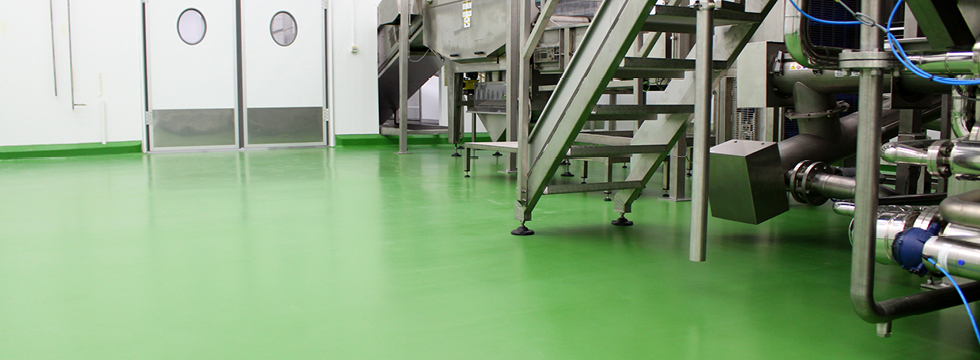
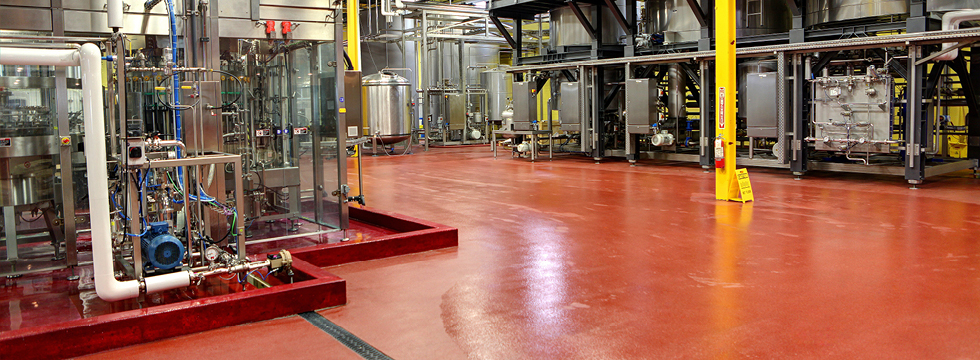
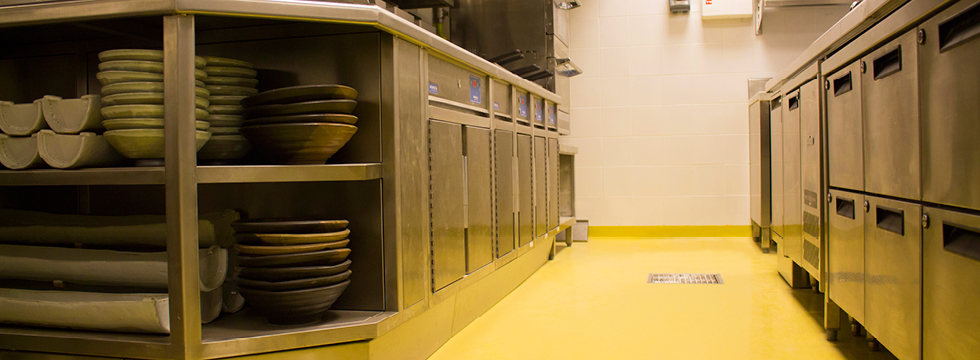
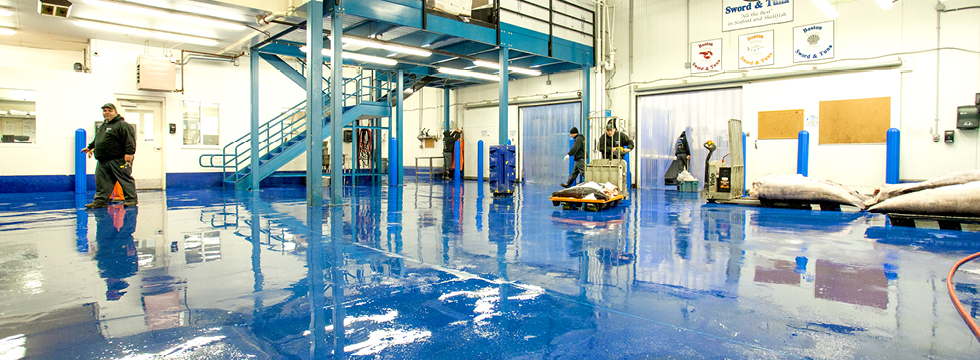
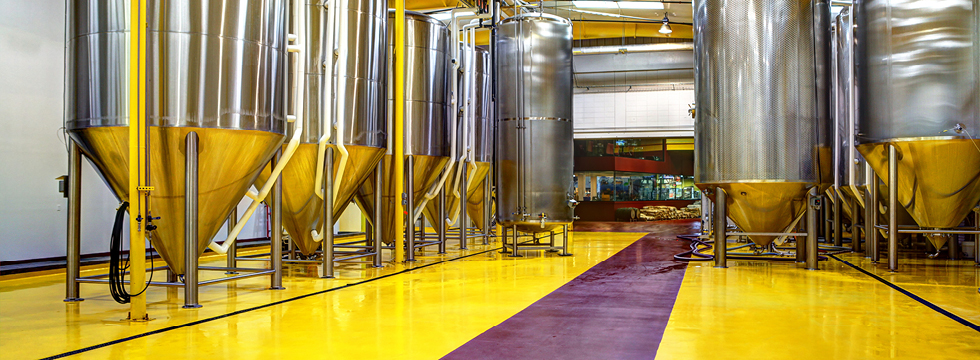
The Flowfresh antimicrobial polyurethane flooring range has been developed by Flowcrete UK to service environments looking to satisfy the highest possible hygiene standards...
Offering the strength, durability and resilience that have long been associated with polyurethane resin flooring products, Flowfresh combines performance with the natural cleaning power of Polygiene® to deliver a flooring surface that continuously promotes the concept of hygienic, decontaminated and clean floors.
Owing to the inclusion of the Polygiene agent - a silver-ion based antimicrobial treatment placed within the resinous flooring material - Flowcrete's Flowfresh floor coating system is proven to inhibit the growth of most types of harmful microbes. Read the Polygiene FAQ’s here.
Flowcrete has recently added a number of new systems to the Flowfresh range, some of which come with a quick, fast-curing option. This rapidly speeds up the flooring installation as well as overall project turnaround.
HACCP/Hygiene
Proving that a building is able to meet a high standard of hygiene is essential in many sectors, especially contamination sensitive settings such as the food and beverage, pharmaceutical and electronics industries. The internationally recognised Hazard Analysis and Critical Control Points (HACCP) management system provides a set of guidelines to ensure that the production process is as hygienic as possible. Flowcrete UK’s polyurethane resin flooring range, Flowfresh, has achieved HACCP International Certification thanks to its ability to create a food safe floor area.
The key aspects of Flowcrete's polyurethane flooring systems that make them an ultra-hygienic flooring solution, include its seamless, impervious, highly durable nature combined with its ability to incorporate coving and stainless steel drainage. Flowfresh even includes the natural silver-ion based antimicrobial agent Polygiene®, which has been proven to meet the ISO 22916 standard.
While initially designed for the food and beverage industry, many other sectors are turning to HACCP International certified building materials, as it identifies systems that can create a highly sanitary working environment able to withstand difficult working conditions.
Antimicrobial/ISO 22196
Today’s intense focus on sanitation standards and cleanliness means that hygiene has to be factored into the very fabric of a building. An antimicrobial agent is homogenously distributed throughout every Flowfresh system to enhance on-site hygiene levels by actively targeting microbes in contact with the floor.
Developed in partnership with Polygiene®, Flowfresh represents a new generation of antimicrobial flooring. The silver-ion based additive within the system pro-actively prevents / disrupts the growth of microbes on treated surfaces.
Natural silver is renowned for its ability to protect against microbes, making it an environmentally friendly alternative to chemically manufactured antimicrobials. Flowcrete incorporates it into a floor in such a way that the bactericidal technology remains active for the lifetime of the coating – even when damaged or worn – unlike traditional surface treatments.
Flowfresh has also been proven to meet the ISO 22196 standard, which measures a surface’s antiicrobial effectiveness on plastics and other non-porous surfaces. The polyurethane coating system underwent rigorous testing to show that it complied with this internationally recognised benchmark.
Safety/Anti-Slip
Slip resistant flooring is a health and safety must-have for most industrial environments and commercial facilities, as otherwise it’s only a matter of time until a member of staff or customer suffers a painful and costly accident. Flowcrete UK’s resin floor systems are available in a range of textures and can be graded with aggregates to create an anti-slip profile that minimises the risk of falls by enhancing traction underfoot.
The diversity of slip resistant floors on offer means that there is a solution for any environment, whether it’s a shopping centre’s food hall, prone to dropped snacks and fizzy drinks or a heavy manufacturing plant that needs to account for oils, greases and fuel.
Flowcrete UK knows all too well that slip resistance often has to be balanced with cleanability and its flooring experts are able to provide advice and information to most effectively combine these dual requirements.
Temperature Resistant
The floor area can be very sensitive to changes in temperature, whether its excessively high, below freezing, very sudden or over a long period of time. Thermal shock for example can quickly cause a floor coating finish to crack, this often occurs during situations such as when the floor is steam cleaned at 120°C or if it is subjected to blasts off -25°C air from an open cold store unit.
Thick, polyurethane floor finishes are highly effective at resisting thermal shock, for example a system such as Flowfresh HF in a 9 mm thick layer will provide an effective barrier against the majority of extreme temperature situations.
This temperature resistance extends to avoiding failures from thermal cycling, when the floor’s temperature is gradually raised or lowered over time. Polyurethane’s thermal coefficient of expansion is similar to concrete, which means that the finish will expand and contract at the same rate as the substrate. Failing to move with the underlying concrete could lead to cracks, debonding, delamination or bubbling.
Moisture Tolerant
Moisture can be a problematic flooring factor for several reasons and unless the substrate, application process and the future use of the site are properly analysed it can easily bring on an early floor failure.
Moisture vapour transmission (MVT) through the concrete substrate is a prime cause of blistering, softening, delamination and disbondment. Flowcrete UK’s extensive flooring experience and comprehensive flooring range means that it can recommend and supply a moisture vapour control coating for any situation.
It’s not just water below the finish that can be a concern, as liquid, spills, intensive cleaning and flood conditions can all damage a floor coating. Hardwearing, waterproof polymer surfaces can withstand heavy and continuous exposure to liquids - retaining a functional, colourful and hygienic surface for an extended period of time despite these factors.









